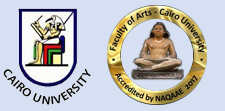عنوان المقال عربي
الترجمة وموضع المترجم: ترجمة إيميلي ويلسون للأوديسا
Document Type
Original Study
Subject Area
Language and Literature
Keywords English
The Odyssey، feminist translation، Emily Wilson، Slavery، POSITION
كلمات مفتاحية عربي
الأوديسا، الترجمة النسوية، إيميلي ويلسون، العبودية، موضع المترجم
Abstract English
The Odyssey is a classic text of undisputed importance and eternal relevance. It has been translated over and over into countless languages. Emily Wilson's translation of the Odyssey published in 2017 created a sensation for being the first translation of the classic epic into English by a woman. Wilson's version is different from the previous translations, all by men, in important respects such as references to slavery especially in relation to women. This article argues that the linguistic choices that Wilson made and which eventually made her translation standout are not related to her gender as a translator, but are rather related to the way she positions herself in relation to the language and culture of both target and source texts. The present article uses feminist translation as a critical approach to explore the cultural and linguistic dynamics at work in d Wilson's version. Sample extracts are provided to demonstrate the difference in trnslayion based on the difference in position.
الملخص العربي
الأوديسا ملحمة كلاسيكية بالغة الأهمية ولا تزال لها تجلياتها في حاضرنا الثقافي والأدبي. وقد ترجمت مرات عديدة إلى عدد لا نهائي من لغات العالم. نشرت إيميلي ويلسون ترجمتها للأوديسا في ٢٠١٧ وأحدثت ضجة كبيرة لكونها أول سيدة تترجم الأوديسا إلى اللغة الإنجليزية مما أثار تساؤلات حول علاقة جنس المترجم بعملية الترجمة وهل كون المترجمة سيدة كفيل في حد ذاته بتخليق ترجمة مختلفة. يحاول هذا المقال توضيح أن ما صنع الفرق في حالة ويلسون هو موضعها الثقافي واللغوي وتعاملاها بشكل مختلف مع موضوعات بالغة الحساسية والتعقيد مثل العبودية والعنف الجنسي خاصة مع العبيد من النساء، وليس كونها سيدة. يستخدم المقال مدرسة الترجمة النسوية لتحليل آليات عمل ويلسون أثناء الترجمة والتي تجلت في النص النهائي، باعتبار النسوية موقفا أخلاقيا وأدبيا يصح للرجال والسيدات على حد سواء كونها تطالب بالعدالة والمساواة للجميع وليس للنساء فحسب. يقدم المقال عينات من ترجمات مختلفة جميهعا من قبل مترجمين رجال ويقارنها بنسخة إيميلي ويلسون لتوضيح الفروق اللغوية في الترجمة والتي نشأت من موضع ويلسون المختلف عمن سبقوها.
Recommended Citation
Aly, Dalia Youssef Said and Yousif, Lubna Abdel Tawab
(2024)
"Translation as Position: Emily Wilson's Translation of the Odyssey.,"
Journal of the Faculty of Arts (JFA): Vol. 84:
Iss.
1, Article 10.
DOI: 10.21608/jarts.2023.214249.1364
Available at:
https://jfa.cu.edu.eg/journal/vol84/iss1/10
Digital Object Identifier (DOI)
10.21608/jarts.2023.214249.1364
Accept Date
2023-07-19
Publication Date
1-1-2024

